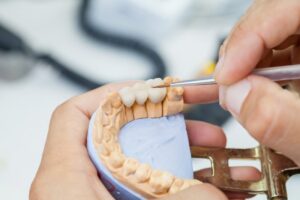
Dental bridges are a popular and effective solution for replacing missing teeth. They restore your smile, improve chewing function, and prevent neighboring teeth from shifting. However, like any dental restoration, a bridge isn’t guaranteed to last forever. While many dental bridges can last 10 years or more with proper care, several factors can lead to premature failure. Understanding what can cause a dental bridge to fail can help you take steps to protect your investment and maintain your oral health. Here are 4 of the most common causes of dental bridge failure.
1. Poor Oral Hygiene
One of the leading causes of bridge failure is inadequate oral hygiene. A dental bridge relies on the health of the surrounding teeth for support. If plaque and bacteria are not properly removed through brushing and flossing, these teeth can develop cavities or gum disease.
Decay under the crowns that anchor the bridge is especially problematic, as it compromises the foundation of the entire restoration. Once the abutment teeth are damaged, the bridge can loosen or collapse altogether.
Prevention Tip: Brush twice a day, floss daily (especially under the bridge), and use an antibacterial mouthwash. Special flossing tools or water flossers can make cleaning around and beneath the bridge easier.
2. Gum Disease
Periodontal disease affects the tissues and bone that support your teeth. If gum disease progresses unchecked, it can weaken the foundation of the abutment teeth and lead to bone loss. This reduces the stability of the bridge and may eventually cause it to fail.
Gum disease can also lead to receding gums, which expose the margins of the bridge and make it more prone to decay and discomfort.
Prevention Tip: Visit your dentist regularly for cleanings and exams. Early detection of gum issues can prevent long-term damage.
3. Bite Problems or Excessive Force
A bridge must be carefully fitted to your bite to ensure even pressure distribution. If the bite is off or you tend to clench or grind your teeth (a condition known as bruxism), excessive force can damage the bridge or the supporting teeth.
Cracks, loosened crowns, or dislodged bridges can result from chronic pressure or trauma.
Prevention Tip: If you grind your teeth, your dentist may recommend a nightguard. Regular checkups can help detect and correct bite problems before they damage your restoration.
4. Poor Fit or Design
Sometimes, a bridge may fail due to improper fit or design from the beginning. If the crowns are not seated properly, gaps may form, allowing bacteria to enter. In some cases, the bridge may not align well with your bite, putting undue stress on specific teeth.
Prevention Tip: Choose an experienced dentist and ensure you attend all follow-up visits to evaluate the bridge’s fit.
Dental bridges are a reliable way to restore missing teeth, but their success depends heavily on the health of surrounding teeth, proper oral care, and regular dental visits. By understanding the potential causes of failure like decay, gum disease, bite issues, and poor design, you can take proactive steps to extend the life of your bridge and protect your smile.
About the Author
Dr. Niki Jayswal graduated from the University of Southern California School of Dentistry with honors, and while there, earned the dental honor society award for outstanding academic achievement. She is committed to continuing education, completing advanced courses and certifications to provide an array of services. Dr. Jayswal also stays current through memberships in the American Dental Association, the Texas Dental Association, and the Dallas County Dental Society. If you’re having trouble with your current bridge or are seeking treatment, Dr. Jayswal and our team can help! Schedule an appointment online or call (972) 366-4452.
